Chances are that I might not have seen Swedish filmmaker Ruben Östlund’s Oscar-nominated film Triangle of Sadness had it not been for its nomination. Such is the still real (although one would be hard-pressed to explain why) standing of the Oscars that an Academy Award nomination for Best Picture almost automatically makes a film a must-see. The film received an 8-minute standing ovation at Cannes (where Östlund won his second Palme d’Or), which may say as much about elite culture’s masochistic appreciation of art which highlights the soul-destroying inequality of contemporary capitalism and the almost comic vulgarity and contemptible shallowness of the rich.
There are many such films. The Menu most recently comes to mind. What Triangle of Sadness reminds me of most, however, is Lina Wertmüller’s 1974 movie Swept Away – updated, of course, to portray the far greater vulgar excess and moral shallowness of contemporary consumer capitalism. It offers much the same moral parable of unexpected calamity overturning the corrupt social order and empowering the competent, hardworking servant class at the expense of the thoroughly dependent and useless idle rich class. Since many more characters are involved than in that memorable 1974 shipwreck, there is also a lot more room for complexity even within the oppressive class structure.
The film follows Carl, a male model, in what is portrayed as a corrupt and oppressive profession, and his girlfriend Yaya, also a successful model. In that particular profession, female models make more money than male models, an inequality which introduces tension into their romance, and sets the stage for one of the varied reversals the shipwrecked survivers will eventually experience. To amplify their vacuousness, Carl and Yaya supplement their income as « social influencers, » which gets them a place on a luxury cruise on a large yacht. The cruise highlights the dysfunctionality of almost everyone involved (not just the wealthy guests but also the captain) and proves no match for a storm which makes many of the passengers sick and a subsequent pirate attack, which is what leaves the survivers marooned on an apparently deserted island.
There, of course, necessity inverts the reigning social pyramid, and Abigail, a lowly member of the yacht’s cleaning staff who has survival skills beyond the capacity of the helpless rich, asserts herself in predictable ways. It is more like Lina Wertmüller than Lord of the Flies, but that possibility too is never too distant. Here too civilization turns out to be not too far away, after all.
Triangle of Sadness – the title comes from Carl’s career’s « professional » vocabulary – could have cut down some on the amount of vomit and excrement and thus become a shorter, tighter film, with its principal focus highlighted that much more. That said, it is well worth both the extra time and some unsightly (somewhat humorous) scenes.




